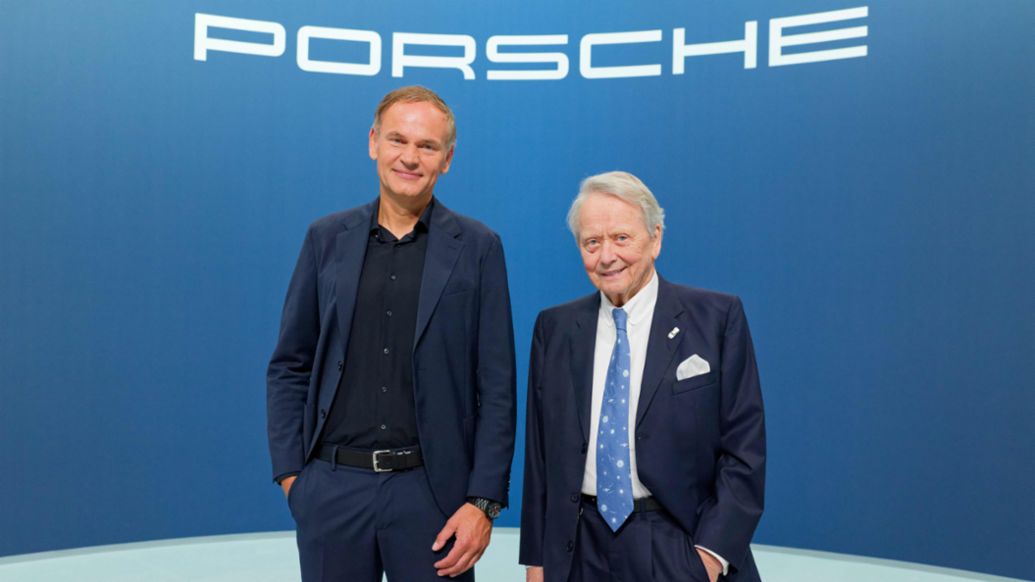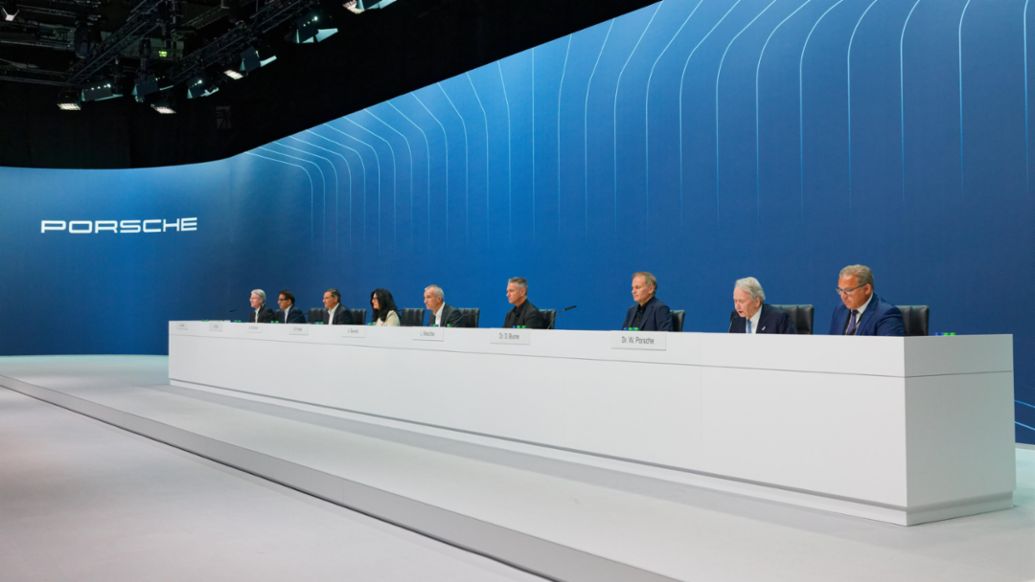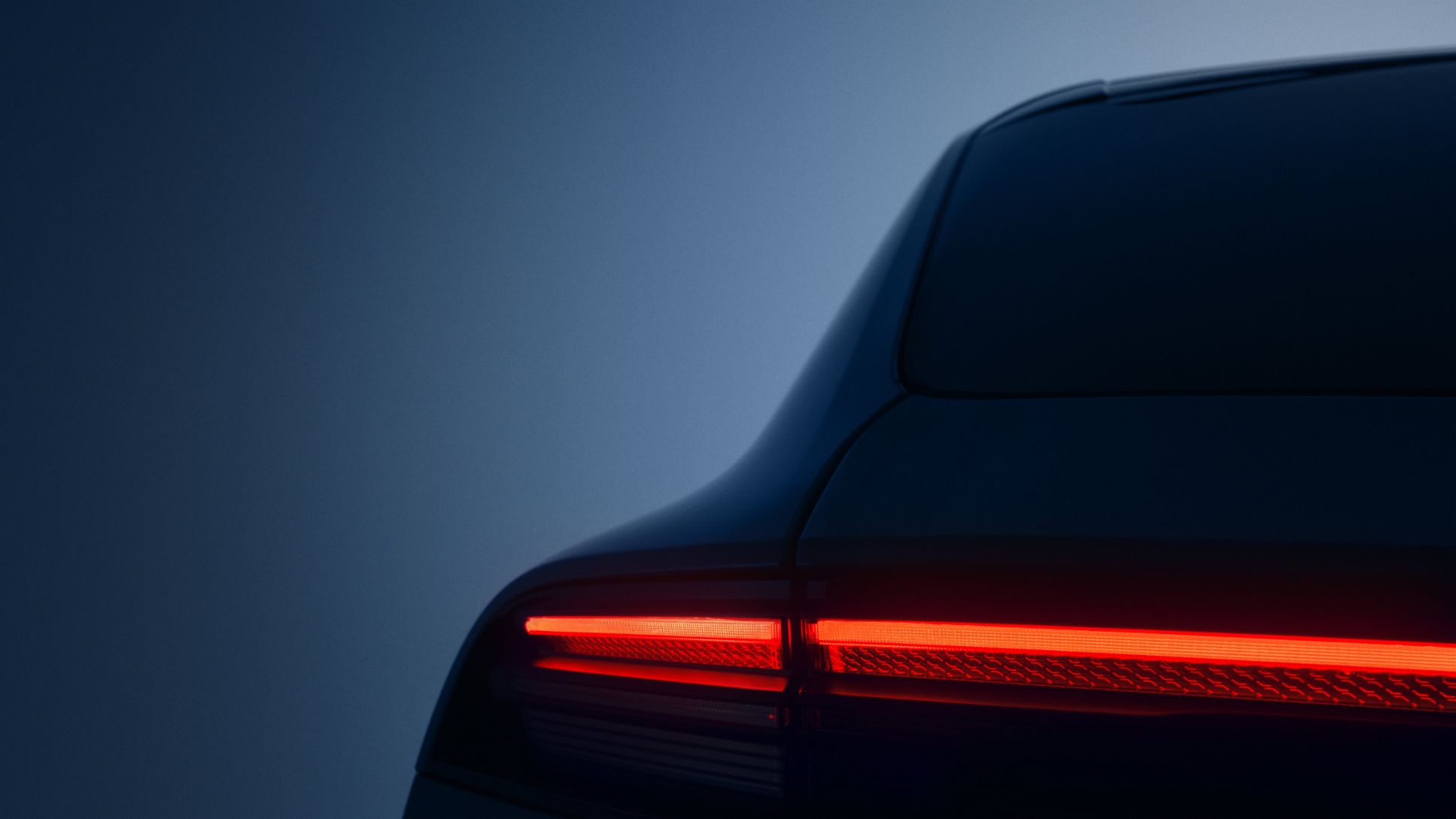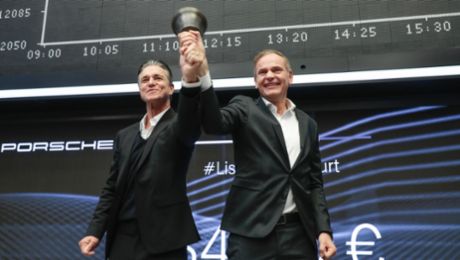- Chairman of the Executive Board Oliver Blume: “In 2023, Porsche impressed while realising all its ambitious forecasts. Our financial position is robust and, even in uncertain times, we remain highly profitable. For Porsche, 2024 is a year of new product launches, with the biggest model launch programme in the company’s history. In the past months we have launched new models for five model series. We are thereby laying the foundations today for our profits tomorrow – and for future dividends.”
- Chairman of the Supervisory Board Dr Wolfgang Porsche thanks the company’s employees: “With your exceptional personal commitment and conscientiousness, you have all made a significant contribution to making the past financial year another successful one, despite all the challenges, enabling us to set new standards with our products in 2023 as well.”
- For the 2023 financial year, the Executive and Supervisory Boards propose a dividend of 2.30 euros per ordinary share and 2.31 euros per preferred share.
“In 2023, Porsche impressed while realising all its ambitious forecasts. Our financial position is robust and, even in uncertain times, we remain highly profitable. At the same time, we struck an even better balance in our sales in the regions of the world,” Oliver Blume reflects.
His outlook for 2024 and the future is ambitious and optimistic in equal measure: “For Porsche, 2024 is a year of new product launches, with the biggest model launch programme in the company’s history. In the past months we have launched new models for five model series. As of this year, we will have the strongest product range in the history of Porsche.” However, Blume also makes clear to the shareholders: “Having so many launches in such a short period is a complex task and a challenge for the company. We are currently gathering the momentum that will take us full speed ahead in 2025. We are laying the foundations today for our profits tomorrow – and for future dividends.”
Chairman of the Supervisory Board Dr Wolfgang Porsche thanks the 42,000 employees: “On behalf of the entire Supervisory Board, I want to express our special thanks and recognition. With your exceptional personal commitment and conscientiousness, you have all made a significant contribution to making the past financial year another successful one, despite all the challenges, enabling us to set new standards with our products in 2023 as well.”

In accordance with the dividend policy, the Executive and Supervisory Boards propose to the Annual General Meeting a dividend payment of roughly 2.1 billion euros for the 2023 financial year. This corresponds to just under 41 per cent of the Group profit after tax, and to 2.30 euros per ordinary share and 2.31 euros per preferred share. In the medium term, Porsche plans to pay its shareholders around 50 per cent of the Group profit after tax.
Alongside the vote on the dividend proposal, the agenda of the Annual General Meeting also includes the re-election of the shareholder representatives on the Supervisory Board, whose term ends at the close of the Annual General Meeting. The Supervisory Board proposes to the Annual General Meeting to elect all 10 current shareholder representatives for a further term.
In the 2023 financial year, the yield per ordinary share was 5.66 euros and the yield per preferred share was 5.67 euros. Group sales in 2023 came to 40.5 billion euros. This equates to an increase of 7.7 per cent (previous year: 37.6 billion euros). The Group operating profit increased by 7.6 per cent to 7.3 billion euros (previous year: 6.8 billion euros). The Group operating return on sales remained stable at 18.0 per cent – despite disruptions to global supply chains and exceptionally high investments in digitalisation, the product and innovation portfolio, and the brand experience. The net cash flow automotive was 4.0 billion euros in the 2023 financial year (previous year: 3.9 billion euros).

With 320,221 vehicles delivered to customers in 2023, Porsche achieved an increase of 3.3 per cent on the previous year, with the various sales regions even more equally balanced than in 2022. “With the biggest model launch programme in the company’s history, Porsche has comprehensively updated the Cayenne, the Panamera, the Macan, the Taycan and the 911. With this we’re halving the average age of our model range. In technological terms, the new products are setting standards in the automotive world. We hold many trump cards in our hand – and now is the time to play them.” Among other topics, Oliver Blume tells the shareholders about the new all-electric Macan SUV, which will be launched in 2024: “Our long-standing bestseller will, now as an all-electric car, continue be the highest-performance model in its segment.” Referring to the updated Porsche 911 presented a few days ago, Blume says: “I am certain that this 911 will set new standards once again.” It is the first 911 with a hybrid drive. Inspired by motorsport, with even more power and even better driving dynamics. On the Nürburgring Nordschleife, the new 911 Carrera GTS was 8.7 seconds faster than its predecessor. “It’s already clear that this high-performance hybrid technology is perfect for the 911 Carrera GTS,” explains Oliver Blume.
As optimistic as he is, the Chairman of the Executive Board also explains to the shareholders the market’s so-called V effect that accompanies every model launch: “With the predecessor model, we have a gradual winding down in terms of the number of units. At the same time, the new generations are introduced in stages based on markets and variants.” This V curve for sales and revenue is normal. Porsche will endeavour to control it as well as possible for each model series. “Porsche has always forged its own way – and always with our customers in mind. We face the headwinds. We go the extra mile. Even if it takes more effort. Especially because we think long term.”
Porsche is investing decisively in its future, not only through new product launches, even – and especially – in challenging times. “Last year alone we invested around 5 billion euros in research and development and in the Porsche ecosystem – the largest amount spent in the history of our company,” Oliver Blume reports. “We are resolutely advancing digitalisation in the company. To the tune of 4 billion euros in the coming five years, more than 350 million of which will be invested in data and artificial intelligence alone.”
Porsche confirms long-term forecasts
Porsche got off to a robust start in the second quarter and is pleased with how demand continues to develop in almost all regions. Only in China has the current demand for exclusive products remained subdued across all markets, both for consumer goods and for cars. Despite the prevailing challenging macroeconomic environment, Porsche AG stands by its forecasts, provided that the macroeconomic circumstances do not deteriorate significantly. For the whole of 2024, the company expects a Group operating return on sales in the 15 to 17 per cent range. This projection is based on Group sales in the around 40 to 42 billion euros range. In the medium term, Porsche is standing by its forecast of a Group operating return on sales of around 17 to 19 per cent. In the long term, the sports car manufacturer is aiming for a Group operating return on sales of more than 20 per cent.
Disclaimer
This press release contains forward-looking statements and information that reflect Dr. Ing. h.c. F. Porsche AG's current views about future events. These statements are subject to many risks, uncertainties, and assumptions. They are based on assumptions relating to the development of the economic, political, and legal environment in individual countries, economic regions, and markets, and in particular for the automotive industry, which we have made on the basis of the information available to us and which we consider to be realistic at the time of publication. If any of these risks and uncertainties materializes or if the assumptions underlying any of the forward-looking statements prove to be incorrect, the actual results may be materially different from those Porsche AG expresses or implies by such statements. Forward-looking statements in this presentation are based solely on the circumstances at the date of publication.We do not update forward-looking statements retrospectively. Such statements are valid on the date of publication and can be superseded. This information does not constitute an offer to exchange or sell or an offer to exchange or buy any securities.



